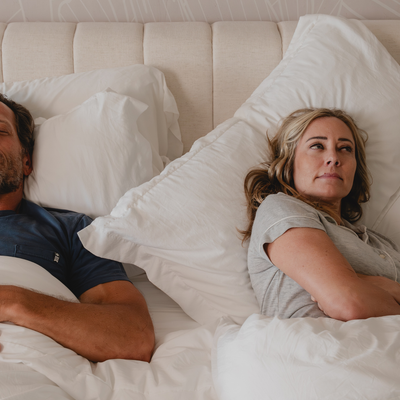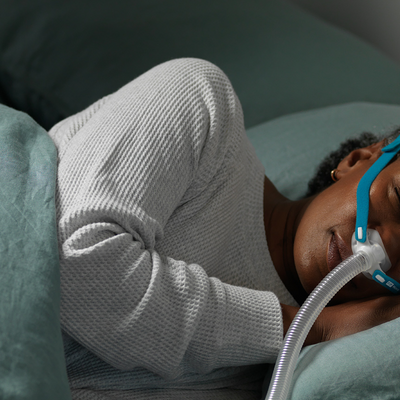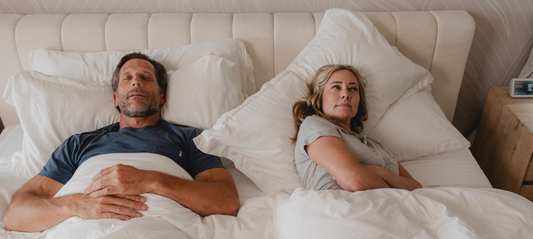An overnight sleep study, also known as a Polysomnography, measures sleep quality and helps to pinpoint whether or not you have a sleep disorder. If you suspect that you have Sleep Apnea, you’ll need to take either an at home or in lab sleep study to confirm a diagnosis and receive a treatment plan. But which sleep study is better for your budget and health needs? Here, we’ll compare the differences between a sleep study at home vs a lab sleep study for diagnosing Sleep Apnea.
In Lab Sleep Study
What to Expect During an in Lab Sleep Study
A sleep lab study monitors your sleep stages and cycles during an overnight stay at either a hospital or sleep diagnostic center. During the night, a sleep lab technician evaluates data that is collected by sensors attached to your head and body. A sleep study doctor will then review your sleep test results and a final report will be sent to your referring doctor to make a diagnosis and provide a treatment recommendation.
Sleep Study Metrics Collected
An in-lab sleep study records extensive metrics to capture sleep patterns, brain activity, blood oxygen levels, sleep stages, heart rate, breathing, airflow, body position, snoring or other sleep sounds and movement in the chest, abdomen, eyes and limbs.
Sleep Disorders Detected
In addition to Obstructive Sleep Apnea (OSA), in lab tests can detect sleep disorders such as Central Sleep Apnea (CSA), insomnia, restless leg syndrome, narcolepsy, periodic limb movement disorder, sleep walking, sleep talking and rapid eye movement (REM).
In lab sleep studies collect more precise and comprehensive sleep metrics than home sleep tests. Therefore, they are recommended for people who may have multiple sleep disorders, sleep disorders other than OSA or a history of cardiorespiratory diseases, stroke, insomnia or hypoventilation.
In Lab Sleep Study Duration
In lab sleep tests collect data during one night of sleep, although it typically takes two weeks to confirm results and a sleep diagnosis from your doctor. If results are inconclusive, you may need to take a follow-up sleep test.
In Lab Sleep Study Cost
Since the in lab sleep study cost varies by clinical facility and test type, it can range from hundreds to thousands of dollars. According to WebMD, the average total cost (not including medical insurance contributions) is at an average of $5,384 and can range anywhere from $600 to $5000 per night.
Medical Insurance Coverage
Many medical insurance providers cover at least part of the cost of a lab sleep study. For example, if you show clinical signs and symptoms of OSA, Medicare covers 20% of the cost after you meet the Part B deductible, while private insurers may reimburse you up to $1,200. Before you sign up for a in lab sleep study, consult your medical insurance provider for specific coverage details.
Advantages of in Lab Sleep Studies
- Precision: In lab sleep studies collect more extensive sleep and body metrics than home sleep studies do, so they can diagnose a broader range and severity of sleep disorders.
- Support: Sleep clinics are staffed with a sleep technician and other healthcare providers who are trained in sleep medicine, so you’ll receive in-person support during your overnight stay at the lab or hospital.
- Suitability: Because in lab sleep studies collect more detailed data and are monitored onsite, they are best suited for people with pre existing conditions such as cardiorespiratory diseases, stroke, insomnia or hypoventilation.
Disadvantages of in Lab Sleep Studies
- Comfort: Sleeping away from home can induce anxiety and poor-quality sleep, particularly in a clinical setting that involves electrodes and machinery. This sometimes may affect the accuracy of sleep tests and results may be inconclusive.
- Time: In lab sleep tests may have longer waiting times. They also require more extensive preparation for an overnight stay.
- Cost: Sleep clinics are more expensive in comparison to home sleep tests and they may not be covered (partially or fully) by medical insurance providers.
- Results: You may not get your sleep results and diagnosis until weeks after your initial sleep study.
At Home Sleep Study
What To Expect During an at Home Sleep Study
A home sleep study uses a portable, wearable device to collect data for one night while you sleep at home. The data collected by the sensors is sent directly to a sleep physician, who will issue a sleep report and, if diagnosed, a prescription and sleep therapy recommendation.
While home sleep study equipment varies by provider, it may include a nasal breathing sensor, chest or abdomen belt, fingertip pulse oximeter, microphone and data collection device. A Lofta home sleep test simplifies this process with the Itamar WatchPAT ONE, a portable device that is worn on the wrist and connects to a fingertip and chest sensor (no nasal tube or body strap required). This home sleep test device is FDA and DOT approved.
Sleep Metrics Collected
A home Sleep Apnea test typically measures airflow, blood oxygen levels and breathing patterns. It does not detect sleep time or sleep stages as does the more detailed in lab sleep study. Read our comprehensive guide on at home sleep testing to learn how it works and how it compares to an in-lab study.
Home Sleep Study Duration
Home sleep studies collect data within one night of sleep. You’ll receive a sleep report within 7 days, plus a follow-up diagnosis and treatment plan from a doctor not long after. If results are inconclusive, your doctor may recommend a follow-up sleep study at a sleep lab.
Sleep Disorders Detected
An at-home sleep study is intended to test for moderate to severe cases of OSA and is significantly more accurate among people at high risk for OSA. Because home sleep studies measure less extensive metrics than in lab sleep studies, they do not provide sufficient information to diagnose non-respiratory sleep disorders such as narcolepsy, insomnia or restless leg syndrome.
At Home Sleep Study Cost
Depending on the provider, a home sleep study can cost anywhere from $189 to $400. (Lofta’s at-home sleep study cost options are available here)
Medical Insurance Coverage
Home sleep studies are often covered by medical insurance companies. If you’re referred for a home sleep study to diagnose OSA, contact your insurance provider to confirm coverage.
Advantages of an At Home Sleep Study vs Lab
- Convenience: You sleep comfortably in your own home, rather than at a sleep clinic.
- Cost Savings: Home sleep study costs are cheaper than lab sleep study costs and as a result, insurance companies are more likely to cover these costs.
- Faster Results: You can order a home sleep study instead of waiting for an appointment at a lab or sleep center and you could receive your sleep test results within 7 days.
-
Ease of use: With Lofta’s sleep study, you’ll receive at home sleep study instructions, a personalized sleep report, a pre-test and a follow-up consultation with a sleep doctor.
Disadvantages of an At Home Sleep Study vs Lab
- Precision: Home sleep studies record less detailed data than in lab sleep studies, so they are best suited for people at high risk for moderate or severe Sleep Apnea.
- Suitability: At Home sleep studies only test for OSA, while in lab studies test for OSA and other sleep disorders. Home sleep tests are therefore not recommended for people with multiple sleep disorders or for those who have a history of cardiorespiratory diseases, stroke, insomnia or hypoventilation.
In conclusion, whether you opt for a home sleep study or a visit to a sleep lab, seeking a diagnosis for Sleep Apnea can greatly improve your overall health and well-being.
For more information about the Lofta Sleep Study, please feel free to visit our web page or get in touch with one of our Sleep Champions via email or call us on 1-800-698-8000. We would love to help you.












































